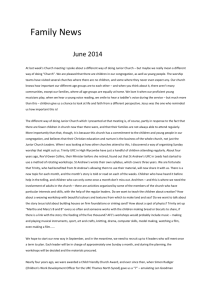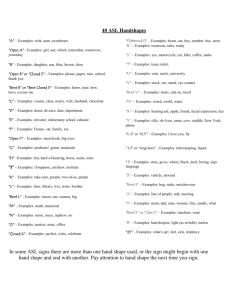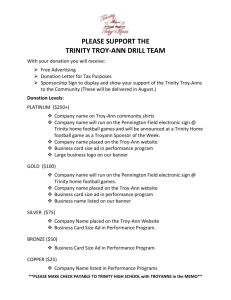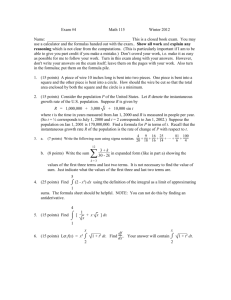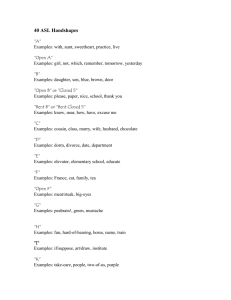Trinity Sunday 2015 Robert VerEecke, S.J.
advertisement
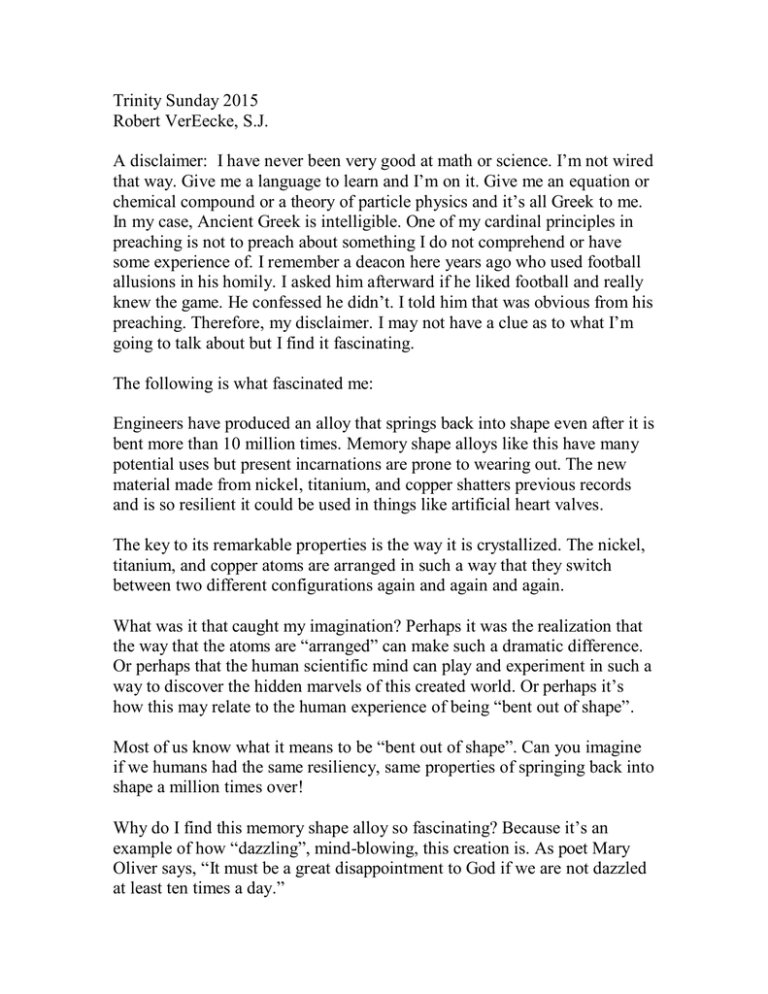
Trinity Sunday 2015 Robert VerEecke, S.J. A disclaimer: I have never been very good at math or science. I’m not wired that way. Give me a language to learn and I’m on it. Give me an equation or chemical compound or a theory of particle physics and it’s all Greek to me. In my case, Ancient Greek is intelligible. One of my cardinal principles in preaching is not to preach about something I do not comprehend or have some experience of. I remember a deacon here years ago who used football allusions in his homily. I asked him afterward if he liked football and really knew the game. He confessed he didn’t. I told him that was obvious from his preaching. Therefore, my disclaimer. I may not have a clue as to what I’m going to talk about but I find it fascinating. The following is what fascinated me: Engineers have produced an alloy that springs back into shape even after it is bent more than 10 million times. Memory shape alloys like this have many potential uses but present incarnations are prone to wearing out. The new material made from nickel, titanium, and copper shatters previous records and is so resilient it could be used in things like artificial heart valves. The key to its remarkable properties is the way it is crystallized. The nickel, titanium, and copper atoms are arranged in such a way that they switch between two different configurations again and again and again. What was it that caught my imagination? Perhaps it was the realization that the way that the atoms are “arranged” can make such a dramatic difference. Or perhaps that the human scientific mind can play and experiment in such a way to discover the hidden marvels of this created world. Or perhaps it’s how this may relate to the human experience of being “bent out of shape”. Most of us know what it means to be “bent out of shape”. Can you imagine if we humans had the same resiliency, same properties of springing back into shape a million times over! Why do I find this memory shape alloy so fascinating? Because it’s an example of how “dazzling”, mind-blowing, this creation is. As poet Mary Oliver says, “It must be a great disappointment to God if we are not dazzled at least ten times a day.” As we keep discovering the possibilities of creation, how much more must we be dazzled by the One who imagined all this in the first place. Today is Trinity Sunday. It’s a day when the temptation is to reduce God, ultimate mystery, to a “formula”, as if God could be reduced to a simple equation: 1 divided by 3 is 1. Huh? I told you I wasn’t good at math. Our hope for today is not to find a formula or equation or even a solution to the question “who is God?” but rather we can be fascinated by the possibilities that God offers. If there can be a shape memory alloy that can be bent out of shape and return to its original shape more than 10 million times, how much the more resilient is the One who created this. If there are chemical bonds that are so strong that they are almost impossible to separate, except for some nuclear fusion or fission (I told you I wasn’t very good at science), if there are bonds so strong in the physical world, can we even begin to imagine the bond of attraction within God, between the Father, Son and Spirit, and the bond that is created between the human and divine in the Incarnation! As St Paul says, nothing can separate us from the Love of God in Christ Jesus. In addition to this being Trinity Sunday, it also happens to be the feast of the Visitation (May 31ist). In the Visitation, we see the image of two pregnant women being drawn together in a celebratory embrace of new life: Elizabeth with John the Baptist, Mary with Jesus. As Elizabeth says, the babe in my womb leapt for joy. Is that what we are asked to do today on this Trinity Sunday/Visitation? To leap for joy at the great mystery of love that is revealed to us in the triune God who has “visited” his people and who remains with us for all Eternity? I think so. Let me leave you this morning with a quotation from Fr. JA’s homily. More science for you!: Anyone know what a quark is? A quark is the name given in quantum physics to the smallest particle of matter in our universe. It is the “stuff” of everything there is (as far as we know today). And it was discovered only a few years ago that quarks only come in threes. They only are observed in relationship. So let’s not disappoint God today. Let’s be dazzled, fascinated, by our Creator and God’s creation. For as the poet Hopkins says, The world is charged with the grandeur of God.
